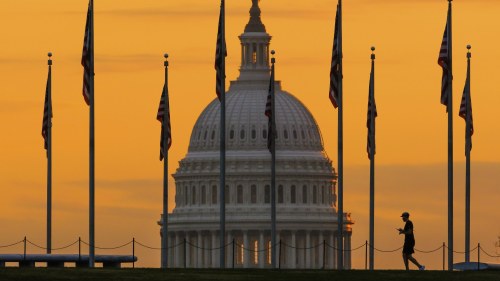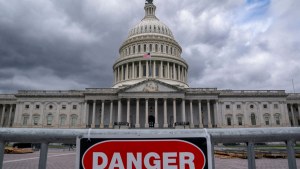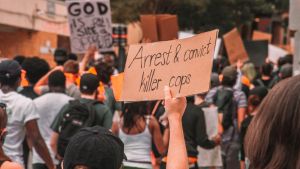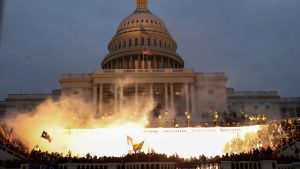Americans across Party Lines Express Concern over Weakening US Democracy

Amid a divisive election cycle, surveys show the US public is worried about the implications of political polarization and eroding democratic infrastructure.
The recent presidential debate was fearfully amusing as former President Donald Trump and current Vice President Kamala Harris snapped at each other from across the stage. Substantive policy issues—including the issue of gun violence—won limited attention as offensive bickering about personal character took precedence. Then, just as after the June debate between Trump and President Joseph Biden, there was an assassination attempt against Trump. The reality of political violence has been remarkably pronounced in recent months, as the ongoing race for the White House is demonstrating American’s chief concerns: political polarization and violence amidst a weakening US democracy.
Data from the 2024 Chicago Council Survey, fielded June 21-July 1, show that a potent majority of Americans consider protecting national democracy the most important issue of the current presidential election. A similar majority regard political polarization as a critical threat to the country. And while Democrats and Republicans report similar concerns and priorities, each party sees the threat across the aisle.
Polarization a Growing and Bipartisan Public Concern
While issues like nuclear proliferation, interstate conflict, and climate change pose threats on a global scale, Americans report more concern for internal (81%), rather than external (19%), threats. Of particular concern to many Americans is the internal threat of political polarization, which six in 10 Americans (61%) consider a critical threat to the country. And unlike many issues, partisanship does not seem to be a dividing line, as responses are similar among Democrats, Independents, and Republicans.
Concerns about political polarization have risen in recent years. The proportion of Americans who classify it as a critical threat increased by 11 percentage points since 2018 (from 50% then to 61% in 2023). As concerns have grown, the issue has remained bipartisan. Since 2020, majorities across party lines have consistently named polarization a critical threat.
Additionally, 2024 data puts weakening democracy in the United States as the highest reported critical threat (67%), surpassing other democracy-related concerns such as the decline of democracy globally (54%) and foreign interference in domestic elections (54%). 1
Protecting Democracy Seen as a Top Election Issue
Reflecting these concerns, more than half of all Americans consider protecting US democracy to be the foremost electoral issue at stake this fall. Six in 10 (59%) say that protecting US democracy will matter a great deal in their decisions for whom to vote in the 2024 presidential elections, narrowly surpassing the economy. Democrats are most likely to report protecting democracy as their top issue (69%), but majorities of Republicans (58%) and Independents (51%) agree.
Despite Partisan Hostilities, Most Want Leaders to Condemn Political Violence
While the parties demonstrate shared concern for political polarization and protecting democracy—and at comparable levels—this is hardly a unifying issue: Democrats and Republicans cite each other as the problem.
Data from a spring YouGov survey fielded March 28-April 4, 2024 show increasingly antagonistic attitudes between Democrats and Republicans. Some 85 percent of Democrats view the GOP somewhat or very unfavorably, compared to 69 percent in February 2023. Similarly, 88 percent of Republicans have an unfavorable opinion of the Democratic Party, jumping 13 percentage points from the previous year’s 75 percent.
For some, those hostile attitudes may justify the political violence so many Americans see as a threat. Preceding both assassination attempts against former President Trump, a March NPR poll asked whether “Americans may have to resort to violence in order to get the country back on track.” Some 12 percent of Democrats, 18 percent of Independents, and 28 percent of Republicans report they strongly agree or agree.
At the same time, per a June survey by the Chicago Project on Security and Threats (CPOST), most Americans want their leaders to condemn political violence; 73 percent of Americans strongly agree or agree that “Republicans and Democrats in Congress should make a joint statement condemning any political violence in America,” with Democrats (85%) moderately more likely to support the idea than Republicans (69%).
Moreover, while eight in 10 Americans agree that “Trump is a danger to democracy,” most Americans oppose using force to either restore him to the presidency (71%) or prevent him from becoming president (66%). Few Americans support the use of force in either scenario (7% and 10%, respectively).
Conclusion
Concerns over political violence, polarization, and democratic instability push Americans to agree that protecting US democracy is one of the most influential issues this electoral season. The perceived causes of this political instability are markedly partisan, with Republicans and Democrats agreeing that the opposing party is to blame.
- 1The threat of ‘Political polarization in the United States’ was not asked in the 2024 Chicago Council Survey.


Related Content
 Public Opinion
Public Opinion
Republicans are focused on inflation and immigration ahead of the November election, while Democrats emphasize abortion policies and democracy.
 Public Opinion
Public Opinion
More Americans consider issues like weakening democracy and political polarization to be critical threats to the United States than foreign adversaries.
 Public Opinion
Public Opinion
Dina Smeltz and Joshua Busby discuss how political polarization poses an extreme threat to the United States.
